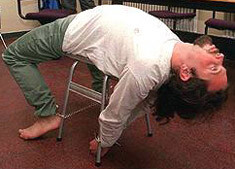World Organisation Against Torture 31 July 2004

An actor performing the “banana method”.
According to the information received, Mr. Amad Sherif was arrested at his home on 12 January 2003 and brought to the Ofer Detention Camp. Soon after he was transferred to the GSS Interrogation Unit at the Russian Compound in Jerusalem and afterwards to the Kishon Detention Center. Later he was sent to the Eshel Prison. An Order Prohibiting Meeting with Counsel was imposed against Mr. Sherif following his arrest. Mr. Sherif’s family appointed attorney Mr. Elia Theodory to represent him, and Mr. Theodory asked attorney Mr. Husam Younis to represent Mr. Sherif on the matter of his incommunicado.
On 9 December 2003, Mr. Younis submitted a pre-petition letter to the State Attorney’s office requesting that the Order Prohibiting Meeting with Counsel be immediately lifted and inquiring into whether any physical or psychological pressure was being used against Mr. Sherif. No answer was received prior to the submission of the petition to the High Court of Justice.
On 10 December 2003 Mr. Younis, representing PCATI, filed an urgent petition to the High Court of Justice on behalf of Mr. Sherif demanding that the Order Prohibiting Meeting with Counsel be lifted and that Mr. Sherif be allowed to meet with counsel. On 14 December 2003 the petition was withdrawn at the recommendation of the Court.
According to information received, Mr. Sherif was held in incommunicado detention until 20 January 2004. That day he met with attorney Mr Hamed El Abed at the Kishon Detention Center who reported that Mr. Sherif complained that he had been tortured during his interrogation.
In a sworn affidavit on 27 June 2004, Mr. Sherif states that at the Ofer Detention Camp his interrogators threatened to use “military interrogation” in his case because he is a “ticking bomb”. He also states that the interrogators slapped him and on several occasions forced him to sit with his back bent (“banana method”) for a half an hour at a time.
Mr. Sherif also complained that during his first 3 days at the Russian Compound Detention Center he was forced to sit with his back bent backwards and that his interrogators tightened his handcuffs until he needed medical attention. Mr. Sherif also states that the interrogators forced him to lean against a wall with his legs bent until he collapsed from the pain and, in addition, to squat for more than one hour. In addition, he complains that the interrogators threatened to arrest his family and deport them to Gaza; one week after his arrest, the interrogators let him see his mother through his cell door, and he claims that they told him that she was under arrest and would remain in detention until he confessed.
OMCT is gravely concerned by the use of incommunicado detention through the issuing of Orders Prohibiting Meeting with Counsel by the Israeli authorities, as this represents a violation of the detainees’ rights under international law. OMCT recalls that such methods gives rise to grave concerns for the detainees’ personal integrity, as they run a heightened risk of being subjected to ill-treatment and/or torture when all contact with the outside world has been blocked.
Related Links